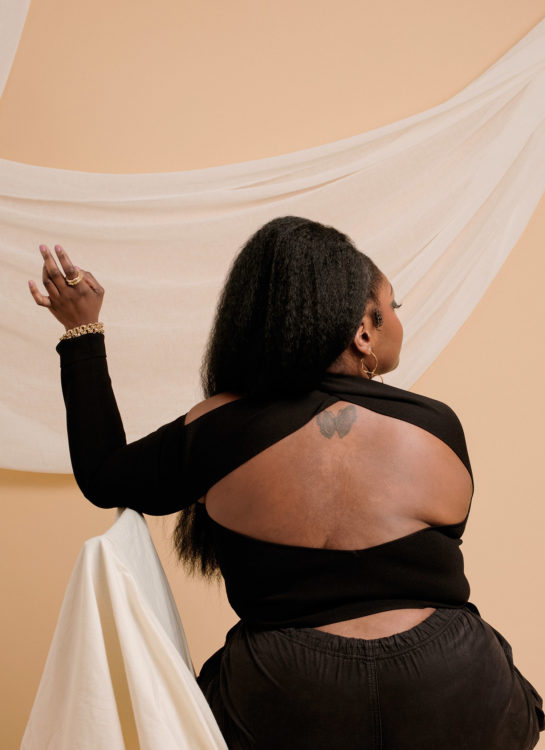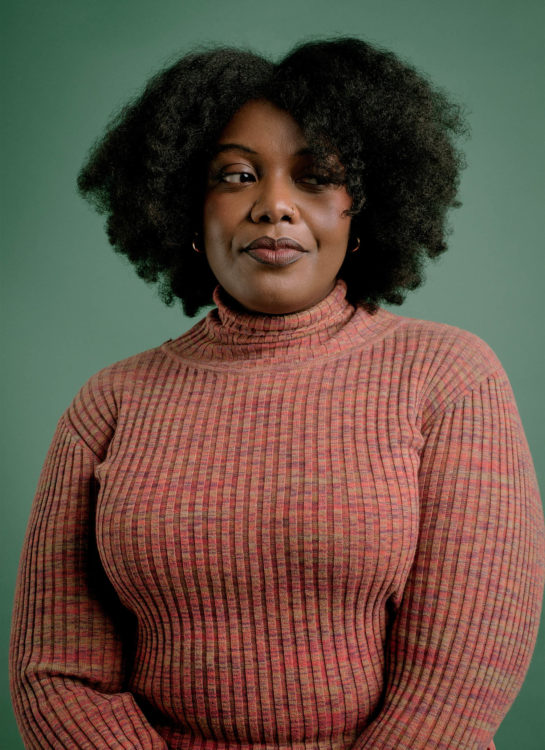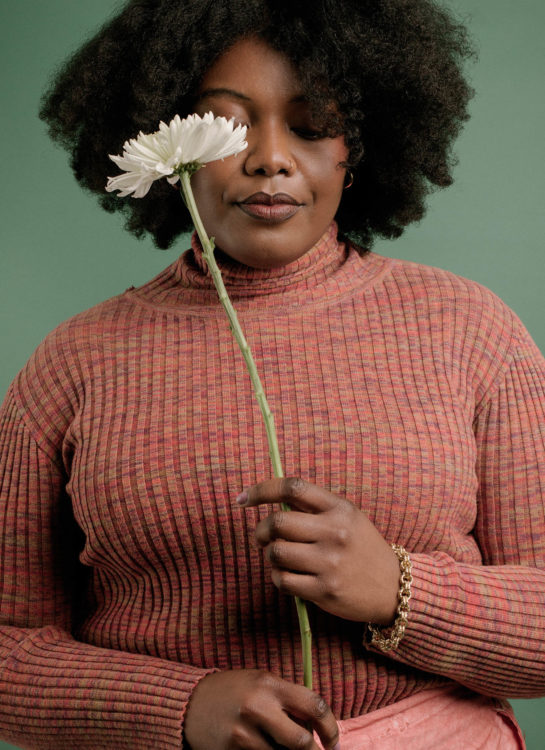- Words Liam Cattermole
- Photography Anna Pierrini
- Photography Assistant Ryanna Allen
- Photography Assistant Dominic Cumberland
- Fashion Connor Gaffe Wills
- HMUA Karla Leon
- MUA Assistant Ceren Yilmaz Dogan
- HMUA Assistant Maria Toniolo
- HMUA Assistant Catherine Munoz
- Production & Location Studio Notion
With the release of her debut album approaching, we sit down with Yazmin Lacey to discuss the power of jazz, Nottingham's creative scene and why she'll always be inspired by improvisation.
“I saw this tweet from Flylo, it was a few years ago now, and he said in the tweet that self-consciousness is the creativity killer, and that just rested with me so heavy. If you’re going to do these things you have to open up yourself, but it’s scary.”
The first line of Yazmin Lacey’s debut record, ‘Voice Notes’ (out 3rd of March), is indicative of her late blooming, but ever blossoming music career. Over shuffling jazz improvisation, the vocalist talks about fear of failure. It’s a self-effacing monologue that introduces her modesty; if it wasn’t for the advice of close friends, the previous trilogy of EPs would never have happened, let alone the new album.
And yet, Yazmin’s music encapsulates these moments of life’s intimacy. Over three projects, the 33-year-olds charmed minds with powerful vignettes and graceful grooves, which sonically illustrate the different environments they were written in. ‘Voice Notes’ follows a similar structure, addressing everything from generational changes to unrequited love over warped soul, reggae and electronica. Although the record’s themes are more developed, there’s always been a rawness to her work. Finding beauty in imperfection, Yazmin’s unfiltered approach has seduced tastemakers like Gilles Peterson and rewarded her millions of views on music platforms like COLORSxSTUDIOS.


Before the influx of high-profile co-signs and support, Yazmin had no intention of becoming a musician. It wasn’t until moving to Nottingham that the Stratford-born artist found her voice, indulging in the city’s various scenes. From open mic events to Lukas Wigflex’s infamous dance nights, the singer-songwriter recalls drunkenly agreeing to play a gig with no songs to her name. Performing two melodies, around a medley of freestyles, she annexed the anxieties that marred her musical confidence, and promised that the show wouldn’t be her last.
Nowadays, Yazmin’s name adorns festival lineups and event spaces across the world. From Field Day’s electronica to We Out Here’s global groove, the multifaceted artist is comfortable in anyone’s company thanks to her back-catalogue’s genre-defying nature. On ‘Voice Notes’, we hear those chameleonic tones shifting tenderly across production from JD. Reid, David Okumu and Melo-Zed, who amplify Yazmin’s storytelling and spontaneous recording style. It’s one of the most anticipated debut albums of 2023, but Yazmin’s too humble to admit so. We caught up to discuss all things ‘Voice Notes’, the power of jazz, drunken chats in the smoking area and more.



It sounds like you’ve had a musical upbringing, performing in church choirs and for family members. Do you have a first music memory?
I actually didn’t have much of a musical upbringing. I did choir but never really stuck at it. In my house, there was always music being played, but when I was younger, I thought I wanted to be an actor. I remember my dad used to sit me on the kitchen counter and he would play records whilst cooking.
What were you personally listening to growing up?
When I was much younger, I loved pop music. I used to watch Top of the Pops, recording the performances that I liked and playing them back on VHS. My parents would play reggae and I used to think, can we not play something newer? My dad used to say that you always return to the music that you grew up listening to, and he was right!
It’s funny you say that you wanted to be an actor, because you’ve mentioned previously that you’re a shy performer. How has performing as a musician been different to acting?
I still felt uncomfortable when acting. Auditioning didn’t feel like a safe space, and it did feel daunting. I started going to youth theatre at Stratford Theatre Royal, which was a real creative and social hub. So, it wasn’t just the acting I was going for, I was going for the vibes. With the music, it feels so exposing still.
Your career started from humble beginnings, and even now it feels like you’re riding the wave with little pressure. But when was the moment that you realised music could become a reality?
After my first experience being in a room with people jamming, I always wanted that feeling again. I loved the environment, it felt so new and interesting. There wasn’t a point where I thought, this must be my path. I’m just rolling with it. Bringing out an album makes it feel more serious, though.
So, it was jazz’s improvisational aspects that made you realise music was something you wanted to get involved with…
Definitely! Although my dad played some jazz, as did my brothers, it wasn’t something that I was obsessed with. My first experience playing with jazz musicians blew my mind. It was inspiring and how I like to make music now.


Moving onto you new record, ‘Voice Notes’, which you’ve briefly mentioned. How did you find progressing from an EP to album format? And what did you learn about yourself during the process?
I’ll be honest, there’s quite a lot to do on an album. In the first instance, I felt daunted. I didn’t make anything for ages. Once I got rid of that [energy] it was fun. I built new relationships with Dave Okumu, Melo-Zed and JD. Reid, which was amazing.
Learning how a project comes together really excites me and has given me new ideas. If I made the album years ago, then everything else wouldn’t have happened, like going on tour and having sessions with amazing musicians. I loved the whole process. It’s only just dawning on me now that everyone’s about to hear it. I feel excited but also a bit nervous.
Did you work with these people in different ways, or did they all share the album’s artistic vision?
I work with them all in a similar way. If I’d have gone in with a set idea, I wouldn’t have made tracks like “Late Night People”, which were so fun. I’m glad that I didn’t feel restricted.
When you first started making music, your early tracks were recorded on a phone. Calling the debut ‘Voice Notes’ feels like a full circle moment. Was this intentional? And if not, what is the meaning behind it?
I had the name ‘Voice Notes’ for a long time but I thought of it differently at the start. With all the conversations happening in my life there was constant communication through voice notes. But ‘Voice Notes’ also refers to the first response where you can hear the tone of what someone’s saying.
Your most recent single, “Late Night People”, is an ode to the after-hours folk. What are your personal experiences in these environments and what’s the best advice you’ve been given in them?
I got my first ever gig in the smoking area. A friend at the time said, ‘Oh you should play this [show]’ and I drunkenly said yes. But I think music is full of late-night people. When I first started making music, I had a full-time job. All my rehearsals would run into the early hours of the morning. When I began getting in with the other musicians, I would go home and sing along to instrumentals to destress.
Dub is one of many genres on the album, and on “Tomorrow’s Child” you rework “King Tubby Meets Rockers Uptown”. What’s the importance of that song to you and why did you want to sample it?
I went to meet my friend Craigie, who I made my first studio song with. It was at the time that I wasn’t really making anything. He had some records in his studio and my dad had just given me some of his, so we started messing around with that one. We were chilling and it felt good; the melody came straight away.


You’ve mentioned that ‘Black Moon’, the first EP, was recorded in your living room with a broken mic. There’s a rawness which still translates into your work today. Why do you wish to maintain this quality?
In some ways, I wonder whether it should be less raw. But I’m comfortable sounding how I sound. I’ve never had an approach; I’ve just tried to enjoy and express myself. Dave and I talked a lot at the start about imperfection, as I never had singing lessons or studied music. This is just how I sound.
“Flylo Tweet” introduces the record and looks at your battle with self-consciousness and fear of failure. Is this something that you’ve had to deal with throughout your career?
This is what makes me nervous about bringing out music because people can read you. Fear of failure kickstarted the album because I’d never made one before. The self-consciousness comes from worrying about what other people may think about it, which is why I didn’t make anything for a while.
Despite being born in east London, Nottingham is the city that kickstarted your music career. Were there any scenes you engaged with during your time there?
Personally, I think that Nottingham is one of the most important parts of the story. I didn’t make any music in London. The fact that I was in a new place helped me to try new things. I suppose, because it’s smaller, you can get around a lot of the scene on a regular basis and get to know other musicians. It was a big influence for me; I went to loads of open mic nights and my first EP and band were made there.
2023 really feels like your year. Beyond music, is there anything else that you’d like to achieve or focus on?
I want to see an elephant this year. I’m also doing my level one wine tasting qualification, so I want to pass that! And musically, after enjoying this process, I want to make more, play more, and collaborate more.

